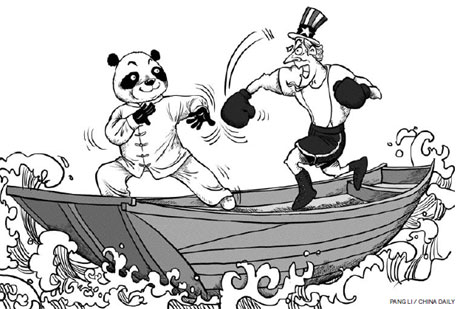 Int'l Snow Sculpture Art Expo in Harbin
Int'l Snow Sculpture Art Expo in Harbin Sichuan money wall for dividend payment
Sichuan money wall for dividend payment Li Na crashes Belinda Bencic in 2nd round at Australian Open
Li Na crashes Belinda Bencic in 2nd round at Australian Open
 Shocking moments when PLA's weapons open fire
Shocking moments when PLA's weapons open fire Famous Lanzhou beef noodles
Famous Lanzhou beef noodles Armed Police hold anti-terrorism drill in SE China's Xiamen
Armed Police hold anti-terrorism drill in SE China's Xiamen Harbin Int'l Ice and Snow Festival opens
Harbin Int'l Ice and Snow Festival opens 'Jin' named the word of the year by cross-strait netizens
'Jin' named the word of the year by cross-strait netizens Chinese scientific expedition goes to build new Antarctica station
Chinese scientific expedition goes to build new Antarctica station
 |
| (Pang Li / China Daily) |
Editor's note: In 2014, is there any possibility that the U.S. will use force against Syria? The situation in Afghanistan may well spiral out of control after US troops withdraw from Afghanistan. Will the U.S. show some restraint after the PRISM scandal? There are many such questions. In brief: compared with 2013, will the year of 2014 be more secure?
The U.S. will have limited opportunities to promote its Asia-Pacific "rebalancing strategy"
Diplomatically, the United States will not relax this "rebalancing strategy", because this region is both the engine of the world economy and the fulcrum of international security. But domestically, while the U.S. economy is on a modest path to recovery, it is not yet fully out of the shadow of the financial crisis. This year the U.S. will hold mid-term elections, so the Republican and Democratic parties will continue to battle over domestic affairs. In addition, due to the rising trend of American isolationism in recent years, Obama has to direct more attention to domestic affairs. All this means that he will have fewer opportunities to promote his Asia-Pacific "rebalancing strategy".
US initiatives in 2014 will include the following:
The first will be to continue to strengthen relations with its allies and consolidate ties with new partners. The U.S. adopted an acquiescent stance on Japan’s plan to rewrite the constitution, to exercise the right of collective self-defense, and to build up its defense forces. However, the disappointment expressed by the U.S. at Abe’s visit to the Yasukuni Shrine on December 26 shows that the U.S. will not allow Japan to go so far as to damage U.S. interests in the Asia-Pacific region.
The second will be to focus on the Asia-Pacific defense system, to try to establish military cooperation with relevant nations to secure its foothold there, and to deploy weapons and equipment in the region.
The third will be to ensure the dominance of the US dollar in the Asia-Pacific region. The U.S. is pushing its TPP agenda, and among its objectives here are to prevent the formation of a unified trading bloc in Asia, to stay involved in the process of regional integration, and to ensure its own geopolitical and economic interests.
The fourth will be to repair any relations with other major powers which have been damaged by the "rebalancing" strategy.

 A 60-hour journey home
A 60-hour journey home Int'l Snow Sculpture Art Expo
Int'l Snow Sculpture Art Expo Highlights of China's air force
Highlights of China's air force Airline crew stage flashmob dance at Kunming airport
Airline crew stage flashmob dance at Kunming airport Top15 countries to retire to in 2014
Top15 countries to retire to in 2014 Hot supermodel's new photo album released
Hot supermodel's new photo album released Asia's heaviest box girder finishes 'rotation' in Wuhan
Asia's heaviest box girder finishes 'rotation' in Wuhan Completed facade of People's Daily new headquarters
Completed facade of People's Daily new headquarters Chinese-branded car passes North America standard safety test for the first time
Chinese-branded car passes North America standard safety test for the first time Li Na beats Bouchard to reach Australian final
Li Na beats Bouchard to reach Australian final  Explore the sources of PM 2.5
Explore the sources of PM 2.5 Highlights of Chinese airborne troops'exercises
Highlights of Chinese airborne troops'exercises  'Living in ice house' competition held in central China
'Living in ice house' competition held in central China  Chinese figure in Oscar nominations
Chinese figure in Oscar nominations  Top ten aerospace events in China 2013
Top ten aerospace events in China 2013Day|Week|Month